#anyways i love the irony of the voice hero having smoking as a coping mechanism
Text
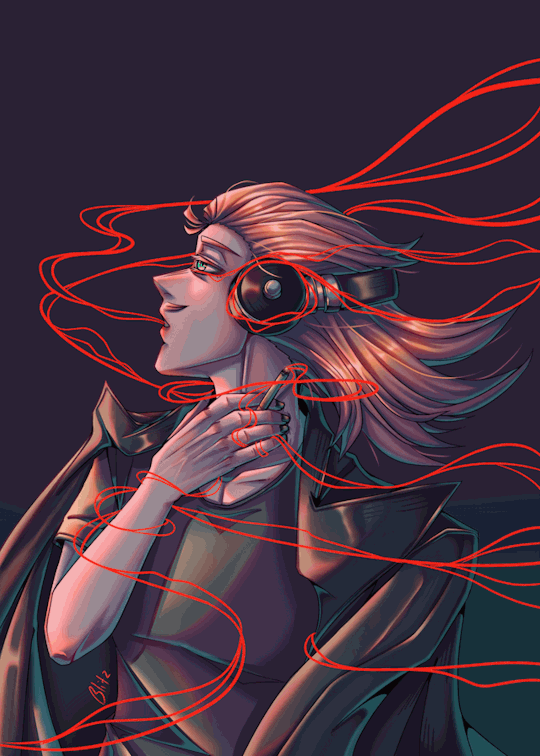
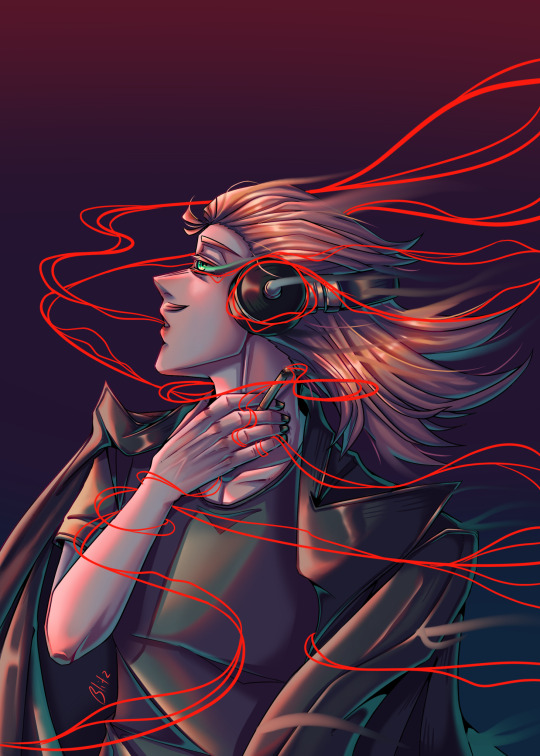
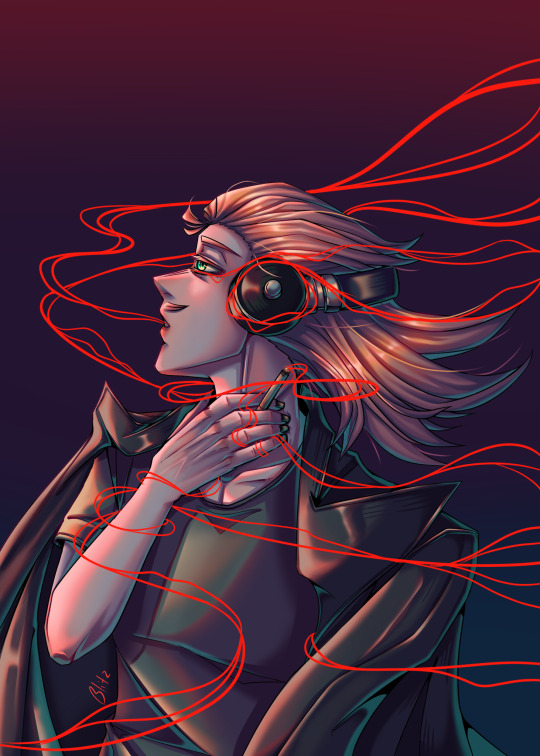
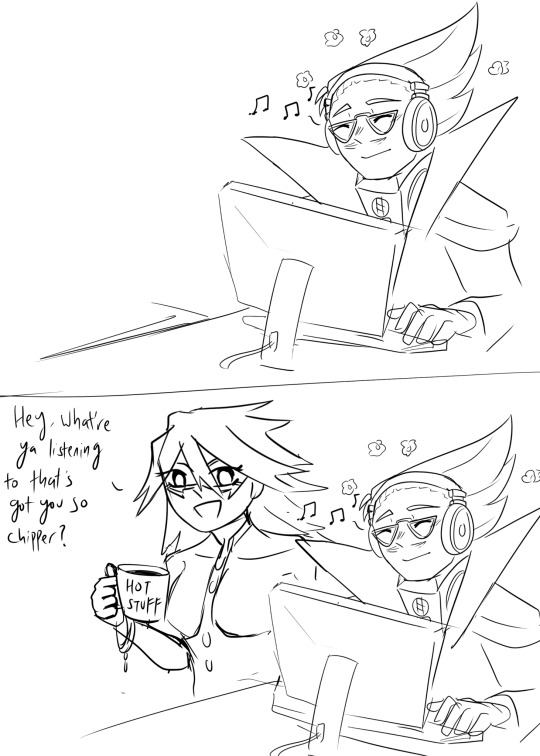
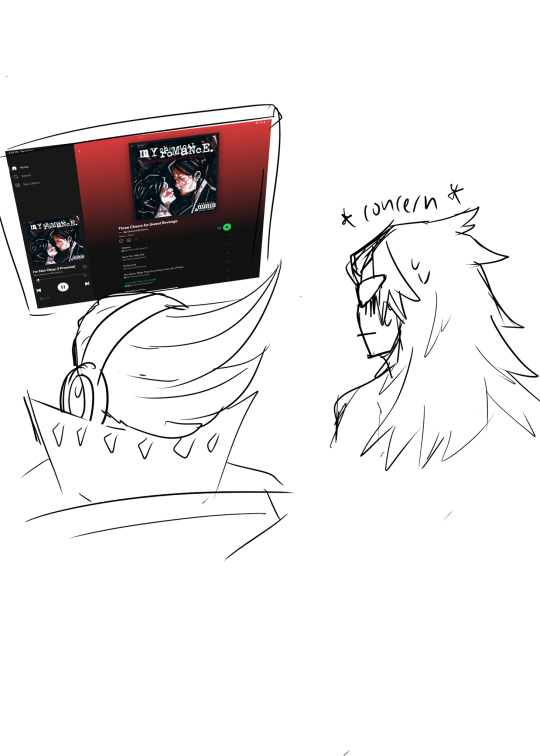
[Vice]
Hehe im a sucker for dramatic lighting
ALSO DONT SMOKE, KIDS!!
#also the animation looked better in my head qwq#anyways i love the irony of the voice hero having smoking as a coping mechanism#like yass kween collect those passively self destructive tendencies like pokemon cards#i may have drank too many sweet drinks oops#present mic#yamada hizashi#hizashi yamada#bnha#mha#bnha fanart#mha fanart#tw smoking#boku no hero academia#my hero academia#art#artists on tumblr
210 notes
·
View notes
Text
dust and bone, pocket holes
Fandom: fh:r (disclaimers: @fallenhero-rebirth)
Pairing: Chargestep
Tags: vague retribution spoilers, implied/referenced suicide, delusions, unhealthy coping mechanisms, survivor guilt!!, first person POV: ortega, m!sidestep but ambiguous enough
He looks scared, as if you wouldn’t have come for him. Relief nearly cripples you by the time you reach him, or when he reaches for you. The chunk of rubble gives when you lift it and he tries not to scream as he comes free.
He comes away like this: spilling from the wreckage, his trajectory looking too much like a half-met tragedy. You catch him on reflex, kind of, grounding him or you or him, him with his hands that drag you downward. The both of you trying to gain ground. Hook, line, sinker. No, that’s not quite right.
The line; where’s the line?
“I’m fine,“ he says, a scrape of sound hoarse off screams. Hook, fingers on your suit. Flaying. When he takes off his mask, he peels it off: disgusted almost, stricken with battle-blood confusion and a silence that tells you nothing. His face twists when you try to catch his eyes, and you wonder how long he’s been suffocating under there. He smothers his face with your shoulder. (His face, a wet streak of sweat and blood and other things he would not admit to you.) He lets you wind your arms around him, bodies seeking alignment. A sinking weight.
The distance between silence and silence, yours and his, bared. A fine line that you want to be traceable, his against yours, hands along skin, parted from suit to suit to scars.
(A finer line is the way moths take into fire, light pitched to black. He’s the thing that runs headlong into storm, perished by his own will. Free. Frantic. Hook—-sinker. Maybe you two have that in common.)
You don’t fall. He leans back a little, and you follow. You can’t tell the difference between the acrid smoke from fried armor or the loose hang of cigarettes in his teeth. Blood slides between your mouths like metal in bones like yours like rust along windpipes like old screws coming loose. If this is a dream, at all, lips becoming love and finding it, new and naked and hopeless, would you press forward as if to seal something there, in this place he has allowed you? (You aren’t scared, no; you have him now. His palms shift and shed ash as they crease across your chest.)
He is dry, lingering the way smoke is; you inhale whatever is left of him, and you can’t breathe when he smirks a little against your mouth. Like the break of a windpipe, made breathless.
The line, you wonder. The thing between him and the next. A line, you do not cross. You leak.
He doesn’t fall. He puts the gun in his mouth, bows, caving around metal. Teeth clattering against the bone of the barrel, sounding like a clock on countdown click, click, click even when you pry it away from him. It doesn’t stop, even though you should have stopped him.
He doesn’t fall. He slips past you.
So, pain. It comes, occasionally so violently it shakes you from your skin, or forcibly perishes the common misconception of invulnerability by ways of lost blood, quite extraordinary amounts of it. You are cold and dying, sometimes, but you are cold mostly because cables run into you, tuning the clock. Extending it. That does not concern you. In order to survive yourself, to survive further: the line that ceased to be.
You can still die, though, an important bit to keep in mind. It’s one of the most human parts of you. Reminder: he always said no. Chen said something did not add up. You didn’t look. How could you? How dare you? (Your heart, another. A difficulty. This is flesh, muscle, the least unchanged out of all of you and physically-speaking the thing should not be such an elaborate metaphor, an irony locked into a machine or man or something else entirely. It kills you. Makes you that martyr that everyone else believes he is.)
The past and present feel displaced, forced apart in brief resentments, wave into wave into wave. Lost to the rhythmic and undying stillness that you do not want. No line to keep, a bunch of sharp nothings. (“You survived,” says the therapist, without irony.)
So, pain. You live with it, it being formless in the same way Guilt is: viscous and boneless. It takes place closest to home, to heart. It piles into your old settlement and greases over, too unclean to be called pure or ice but it bites, clatters your teeth together like spoons and scraped knees. Your soul is wooden, wounded, and you creak. Rickety, like a decrepit cabin spread on sand, and you were made to last, weren’t you. How you have, you think before his body-void casket: outlasted him and them and even yourself.
So strong. My hero, is his voice in macabre tones, careening into laughter strange and terrible. Grotesque, the way he has gotten in you, the way he is, run down edges and chafing. The way he was: underneath your skin. A thin viscous marrow, running into you.
It doesn’t take long for you to buy a pack of cigarettes. An old brand, a cheap vice, one you remember. You use it to remember (he breathes through you). Chen sees and says nothing. You never listened to him, anyway.
(“So sentimental,” he says, sneers. “You will make an old man yet.”)
He couldn’t read your mind. Your brain wasn’t open for interpretation, but the rest of you had been.
But isn’t that why he lingered? Your brain, wired wrong in just the right way so that he could not hear you, like he did others. He stayed for it, your presence which did not give way to unwanted thoughts. He was not haunted by you.
The heart is in the mind, reflected there like an opaque rhythm. The two are not totalities a dichotomy apart. Maybe then it was, in an implicit and unkind sense. He could not sense you and therefore could not see you, understand you and your–what. What.
("Spit it out,” he demands, eyes wide and ragged–ripped open, vehemence pried out like fingers choked along skin-suits. As if suddenly unclenched, or caught. As if mauled. “What do you have to say?” He looks angry. He looks sad. You don’t remember him like this. You don’t. Remember.
It’s pointless, but you answer him anyway. A barb that your tongue cuts in two: “I was in love with you.” )
In your dreams, he does not die wrecked in speechless silence. There is no scream or an abused voice, so maybe this is how you know that this isn’t yours. (“You’ll regret this,” and he looks at you like you are the thing moths fly to and die in.)
In your dreams, you seal a promise there, in the place he has allowed you. It transforms, tumbling through you and him, colliding. Breathless, the point at which ghost meets chest. He topples, tumbles, breaks away–and he doesn’t fall.
You are still left with nothing to save.
The point is, you lose. And lose. Blood, face, pride, limbs, sanity, friends, lovers, heart and whatever it is that keeps you up at night. All rendered to nothing. It doesn’t matter what they meant, if they were going to mean something.
There is always something. (Him; redundant; as natural in the way you breathe, sucker, stupid, sentimental. Repeat.)
You go back because you want to save someone or some-thing. The crumpled pack of cigarettes sits in your pocket. (That is what is wrong here. Nothing is as it seems.) Chen almost smiles when you come through the door.
“Here,” he says, offering a cigarette in your direction. You look at it, then at his face, lifted towards you. “I don’t smoke,” you say dumbly.
He only raises an eyebrow and doesn’t withdraw. Neither of you move; you are putting weight on your injured leg, a minor thing with pain leftover. There wasn’t much of a battle this time. You shift, and it hurts, but only just. He looks at you, expectant. You take the cigarette, two fingers pinching it, trying to hold it naturally. You don’t bring it to your lips (press the thing between your teeth where you can taste him). He makes a small noise of triumph, and you hold back a similar sound, like concession.
“Like this.” He lights his own, then presses close to light yours. They catch on fire, and he motions towards his lips, where he slots the cigarette. You do the same and immediately choke.
“No,” He is saying, snorting, collapsing into a small series of hiccuping sounds. A laugh. He is laughing at you, through the veil that covers his face, seething under a blank sky. “Wrong,” he manages to choke out in the in-between. The cigarette burns, and you let it burn. “What?” You try to say. “Why?” You try to ask. It smells like him. You are breathing in, burning it along your throat. Vague, acrid, a line or this trace of him. The smoke is up your nose, sliding over your tongue.
Sinker. Sucker, he says in a voice you can no longer hear.
22 notes
·
View notes